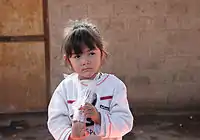Burmese Gurkha
Burmese Gurkhas (Burmese: ဂေါ်ရခါးလူမျိုးများ; Nepali: गोरखाली) are a group of Nepali language speaking Burmese people of Gurkha ethnic group living in Myanmar (formerly Burma). While the Gurkhas have lived in Burma for many centuries, it was during the British rule in Burma that the majority of the Gurkha migrated from Nepal.
 | |
| Regions with significant populations | |
|---|---|
| Myanmar, Yangon, Mandalay, Mogok, Pyin Oo Lwin, Taunggyi, Mandalay Division, Shan State, Kachin State | |
| Languages | |
| Burmese and Nepalese | |
| Religion | |
| Hinduism, and Buddhism | |
| Related ethnic groups | |
| Nepalese peoples and Indian Gorkhas |
The estimated population of Gurkha is nearly 1 million.The majority of Gurkha now reside in Yangon (Rangoon), Mandalay, Pyin U Lwin, Mogok, Tamu, Kalaymyo, Taunggyi, and other parts of the country.
History and demography
Like many other people who reside in Myanmar and who have their origin in Nepal, the majority of Gurkha came along with the British administration. Many Gurkhas served during the Second World War in the Burma Campaign, especially as rear guard units for the British retreat from Burma
After Burma's independence in 1948, the Gurkhas joined the infant Burma Army. Many Gurkhas served in the new republic's various campaigns against ethnic insurgents and the Kuomintang invasions. The Gurkha were considered key assets of the Burmese Army in the 1950s.[1]
Culture
Many Gurkha in Myanmar practice Hinduism and Buddhism. There are a few Gurkha Buddhist and Hindu temples in the cities around Kachin State, Shan State, Yangon and Mandalay. Gurkha form a large minority in Myitkyina, Mogok and the hill station of Pyin U Lwin (Maymyo).
Notable Gurkha people in Burma
- Private Aung San Thuriya Suk Bahadur Rai – No.4 Burma Regiment (4th Gurkha) Myanmar Army.[4] – recipient of the Aung San Thuriya award, the highest gallantry award in Myanmar.[5]
- Suk Bahadur (Burmese: ဗဟာဒူး) is a Burmese footballer who served as the captain of Myanmar national football team (1952–1970). He is considered as the greatest Burmese footballer that ever lived for the tremendous success he brought to country's football. He's also a major in Myanmar Army[6]
- Corporal Thiha Thura Man Bahadur Thapa – No.4 Burma Regiment (4th Gurkha) Myanmar Army
- Lt. Colonel Zeya Kyawhtin Thura Lachhuman Rai- No.4 Burma Regiment (4th Gurkha), Myanmar Army
- Colonel Zeya Kyawhtin Tanka Dhoj -Director General of Hotel and Tourism Department under Ne Win's government.
- Lt. Colonel Raj Bahadhur Lama-(A 1) Eastern Command , Myanmar Army
- Major Zeyakyawhtin Bhagiman Subba – No.4 Burma Regiment (4th Gurkha), Myanmar Army
- Assistant Director Arun Kumar- Internal Revenue Departmant, Ministry of Finance, Union of Myanmar
- Professor of Chemistry Attar Singh Chettry (M.Sc.), Mandalay University, Myanmar
- Gannes Basnet (Advocate ) first Gurkha Candidate for Myanmar Parliament
- Cherry Myae Maung Tin Tun (Writer)
- Nyein Thazin (Taekwando) two gold, three silver and two bronze medals
- Nanda Soe @ Maha Nandar Gyawali Kick boxer
References
- Defence Museum, Yangon
- Burma Citizenship Law harsh on ethnic Burma Citizenship Law harsh on ethnic|"Archived copy". Archived from the original on 2011-01-23. Retrieved 2013-05-14.CS1 maint: archived copy as title (link)
- Burma Citizenship Law 1982|http://www.unhcr.org/refworld/docid/3ae6b4f71b.html
- Defence Museum, Yangon
- "ဆာ့ခ္ဗဟာဒူးရြိဳင္း၊ (ေအာင္ဆန္းသူရိယ)". Retrieved 2018-04-19.
- "Hamro Myanmar". sites.google.com. Retrieved 2018-04-19.
Further reading
- May Myo Chit Swe, "Myanmar Pyi Phwar Gurkha", 2000 November (in Burmese).
- Scott of The Shan Hills, Edited By G.E Mitton(Lady Scott)
- Report of Frontier Areas Committee of Enquiry, Part 2,1947
- Burma Gazetteer,28.6.1948
- Ruby Mines District Gazetteer
- New Times of Burma,7.6.1948
- New Times of Burma,10.6.1948
- The Hundred Days of Burma, Lt.MACHOTON